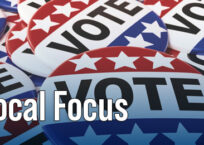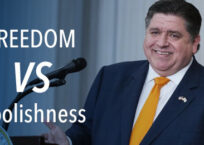
On Tuesday, John Keilman wrote a lighthearted editorial on last week’s annual dishonest campaign by the American Library Association (ALA) laughably named “Banned Books Week.”
His personal story was revelatory. Keilman shared that when he was young, pulp novels with “absolutely no redeeming value” beckoned with an irresistible force. He describes what so powerfully attracted him: their “lurid” titles and the cover art which depicted the hero with “his arm around a busty woman, blasting a hole through some underworld stooge.”
But then after explicitly stating the sexual and violent language and imagery that served as “catnip to a preteen” boy, he almost-deftly switches his argument.
After describing the features that actually appealed to him, he then spends the rest of the article suggesting that what motivated him to sneakily read these novels was parental disapproval. From that strained but common argument he posits, perhaps disingenuously, that since kids are attracted to books that parents prohibit, if we just prohibit good books, kids will be attracted to them. Yes, Keilman believes that all parents need do is furrow their censorious brows at Moby Dick and before they know it, little Betty will be hidden under her covers with a flashlight reading about Ahab’s battle with the great fish.
Here are some of the issues surrounding “Banned Books Week” that Keilman ignored:
- Most parents are not requesting that a book be banned. Most parents are requesting one of three things: 1. that a book be moved to an adult section of the library, 2. that a library not use its limited resources to purchase a particular book, or 3. that a publicly funded school not select a particular book to be taught.Parents are not requesting that publishing companies be prohibited from publishing particular book titles, that parents be prohibited from purchasing them, or that Amazon stop selling them.
- Books that are never purchased can’t be “banned.” So, for example, when school and community libraries refuse to purchase or request books that espouse conservative assumptions about the nature and morality of homosexuality, there’s no opportunity for “progressives” to “ban” books. Their censorship is achieved prior to the purchase of books; it’s far more comprehensive; and it’s much more cunning in that librarians have created the de facto censorship protocol, euphemistically named “Collection Development Policies” (CDPs), that effectively bans books they don’t like (i.e., conservative books) with nary a controversial word messily spilling out into the public square. If CDPs resulted in no books being purchased that espouse liberal assumptions about homosexuality, you can bet your bottom dollar that ALA members and diversity devotees everywhere would throw a wobbly even Rumpelstiltskin would admire.
Here’s an interesting exercise for Mr. Keilman and anyone who cares about both intellectual diversity and how their taxes are spent: Search your local high school’s or community’s library catalogue from the comfort of your home using the search terms “sexual orientation,” “lesbian,” “gay,” and “homosexuality.” Count up how many resources espouse liberal assumptions about the nature and morality of homosexuality (scores and scores) versus how many affirm conservative assumptions (close to nil).
Then try to get your library to fill the gaping hole in its book collection by ordering some of these:
- A Queer Thing Happened to America by Michael L. Brown
- Divorcing Marriage edited by Daniel Cere and Douglas Farrow
- The Gay Gospel by Joe Dallas
- The Bible and Homosexual Practice by Robert A.J. Gagnon
- The Meaning of Marriage: Family, State, Market, & Morals ed. by Robert P. George and Jean Bethke Elshtain
- Light in the Closet by Arthur Goldberg
- Ex-Gays?: A Longitudinal Study of Religiously Mediated Change in Sexual Orientation by Stanton L. Jones and Mark A. Yarhouse
- The Marketing of Evil by David Kupelian
- Homosexuality and the Politics of Truth by Jeffrey Satinover, M.D.
- Outrage: How Gay Activists and Liberal Judges are Trashing Democracy to Redefine Marriage by Peter Sprigg
- Marriage on Trial: The Case Against Same-Sex Marriage and Parenting by Glenn T. Stanton and Dr. Bill Maier
- The Homosexual Agenda: Exposing the Principal Threat to Religious Freedom Today by Alan Sears and Craig Osten
- Same-Sex Marriage: Putting Every Household at Risk by Matthew D. Staver
- Out from Under by Dawn Stefanowicz
- Correct, Not Politically Correct: How Same-Sex Marriage Hurts Everyone by Frank Turek
- Homosexuality and American Public Life edited by Christopher Wolfe
- Same-Sex Matters: The Challenge of Homosexuality edited by Christopher Wolfe
- Out of a Far Country by Christopher Yuan
If your library refuses to order any of these books citing Collection Development Policies as their reason, remind them of these words from the former head of the ALA’s Office of Intellectual Freedom, Judith Krug:
We have to serve the information needs of all the community and for so long “the community” that we served was the visible community…. And so, if we didn’t see those people, then we didn’t have to include them in our service arena. The truth is, we do have to.
…
We never served the gay community. Now, we didn’t serve the gay community because there weren’t materials to serve them. You can’t buy materials if they’re not there. But part of our responsibility is to identify what we need and then to begin to ask for it. Another thing we have to be real careful about is that even though the materials that come out initially aren’t wonderful, it’s still incumbent upon us to have that voice represented in the collection. This was exactly what happened in the early days of the women’s movement, and as the black community became more visible and began to demand more materials that fulfilled their particular information needs. We can’t sit back and say, “Well, they’re not the high-quality materials I’m used to buying.” They’re probably not, but if they are the only thing available, then I believe we have to get them into the library. [emphasis added]
According to Krug, intellectual diversity is of such paramount importance that it trumps even quality of material. And if resources are scarce, Krug believes it is the obligation of librarians to ask for them.
In remembering the books that so tantalized him as a boy, Keilman offered one other illuminating reflection: “If they never make the most-challenged list, it’s probably because no respectable school library would stock them in the first place.”
To read more on IFI’s response to “Banned Books Week” (and the Tribune), click HERE.

























